Golden Retrievers are one of the most well-known and beloved breeds. It’s hard to believe they aren’t perfect pups, but this breed isn’t for everyone. Even their owners share some common complaints about Golden Retrievers.
Golden Retrievers are large, expensive dogs prone to various health problems, including cancer. They’re clingy and high energy, and their fur must be brushed regularly. They’re best suited to families who want to spend much time with their dogs.
In this article, we’ll discuss the 20 common complaints about Golden Retrievers to help you decide if they’re genuinely the dogs for you.
Why do People Love Golden Retrievers?

Golden Retrievers are the third most popular dog breed in the United States.
©demanescale/Shutterstock.com
Golden Retrievers certainly aren’t bad dogs. Their popularity is for good reason! These dogs are friendly, easy to train, and adaptable to various lifestyles.
They fit right in with many families who enjoy having a high-energy, silly pup who is also content to relax with the family in the evenings. Goldens tend to do well with kids and other pets so long as they’re introduced and trained properly and the dog’s boundaries are respected. As with any breed, they should never be left alone with small children.
They have good stamina and love outdoor activities like hiking, swimming, or playing fetch. They’re also loyal dogs who love to be at your side.
However, these dogs aren’t perfect for everyone, so let’s dive into 20 of the Golden Retriever’s faults.
20 Common Complaints about Golden Retrievers
1: They’re Big Dogs
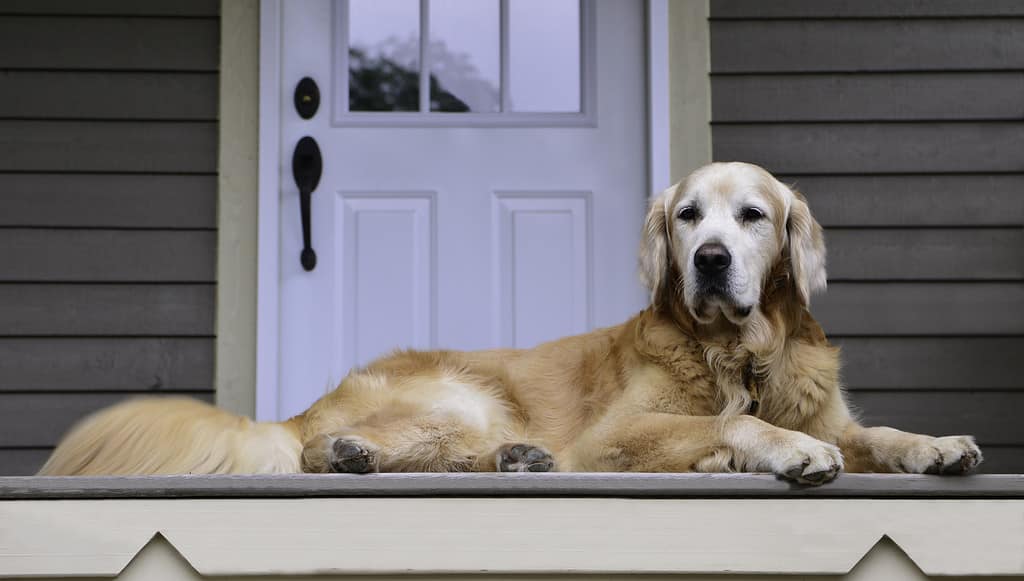
Golden Retrievers can weigh up to 75 pounds.
©iStock.com/LucBrousseau
Adult Golden Retrievers stand 21.5-24 inches at the shoulder and weigh 55-75 pounds. If you want a puppy that stays small, this isn’t the breed for you!
Larger dogs can be more difficult to handle. An untrained Golden will pull on their leash when walking, and you may struggle to lift them in an emergency. Add to this that larger dogs are more likely to suffer from joint conditions, which is worth considering before adopting.
2: They Don’t Live as Long as Small Dogs

Their lifespans are short compared to smaller dog breeds.
©Yobab/Shutterstock.com
The average Golden Retriever lives 10-12 years, a good lifespan for their size. However, they don’t live as long as most smaller dog breeds.
If you’re used to that longer lifespan, you know how precious those extra years together can be.
3: Golden Retrievers are Expensive

You can expect to spend thousands of dollars throughout your Golden Retriever’s life.
©iStock.com/Photology1971
Also linked to a Golden Retriever’s size is their expenses. They will cost more to feed, and their vet care will typically be more expensive than you’d expect for a smaller dog. Medications must be prescribed in higher dosages, and even everyday items must be bigger and sturdier.
It doesn’t help that Goldens are chewers. Retrievers love to put things in their mouths, even more than your average dog, so you’ll likely go through some shredded toys. Toys they cannot tear will be more expensive, and they might even chew things they aren’t supposed to, like your shoes or couch cushions.
4: They Can be Clingy
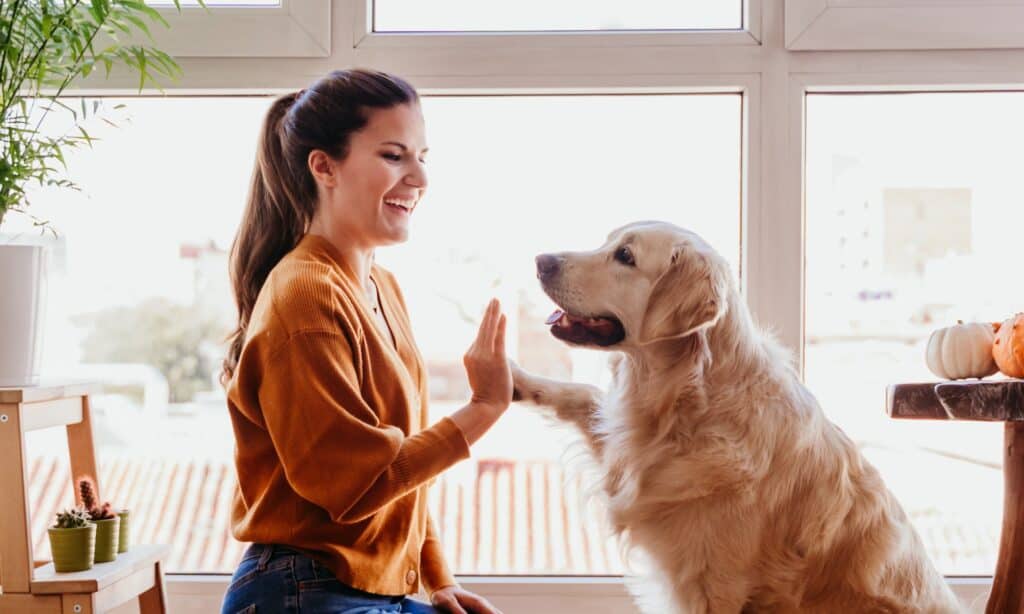
Goldens love to be around their favorite people and get sad when left alone.
©iStock.com/Eva Blanco
This might not be the right breed if you don’t love a cuddly dog. However, every dog is different, and you’ll find Goldens who don’t want to cuddle.
They’ll likely follow you around the house because these dogs want to be at your side. It’s important to involve them in family activities and not to leave them alone for extended periods.
You will also want to teach them how to be alone for short amounts of time, such as a few hours. This is a crucial skill for all dogs to learn, even if someone is usually home for them, and it can help prevent separation anxiety. Set realistic expectations and take things at your dog’s pace.
5: Separation Anxiety is Common in the Breed
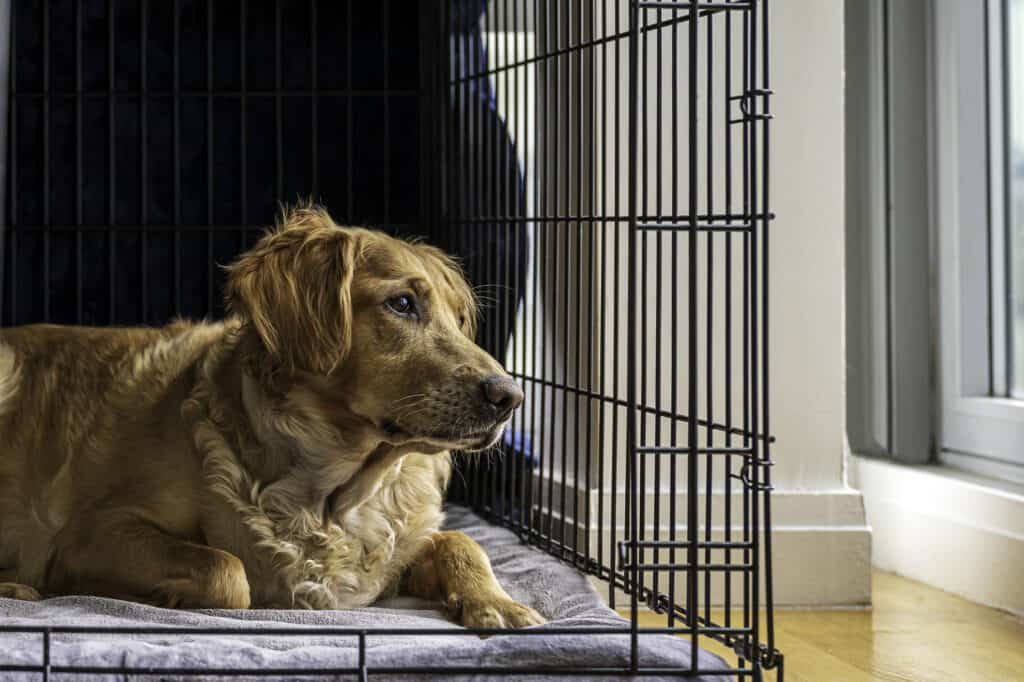
Many Golden Retrievers have separation anxiety.
©iStock.com/Christine McCann
Golden Retrievers love their humans so much that they easily become anxious when left alone. Separation anxiety is debilitating for a dog, causing great distress. It often causes them to act out when you see things like destructive chewing, whining or barking, or even trying to escape the house.
It’s important to take this condition seriously and to enlist help from a force-free dog trainer or behaviorist and your veterinarian when necessary.
6: They do Best as Family Dogs
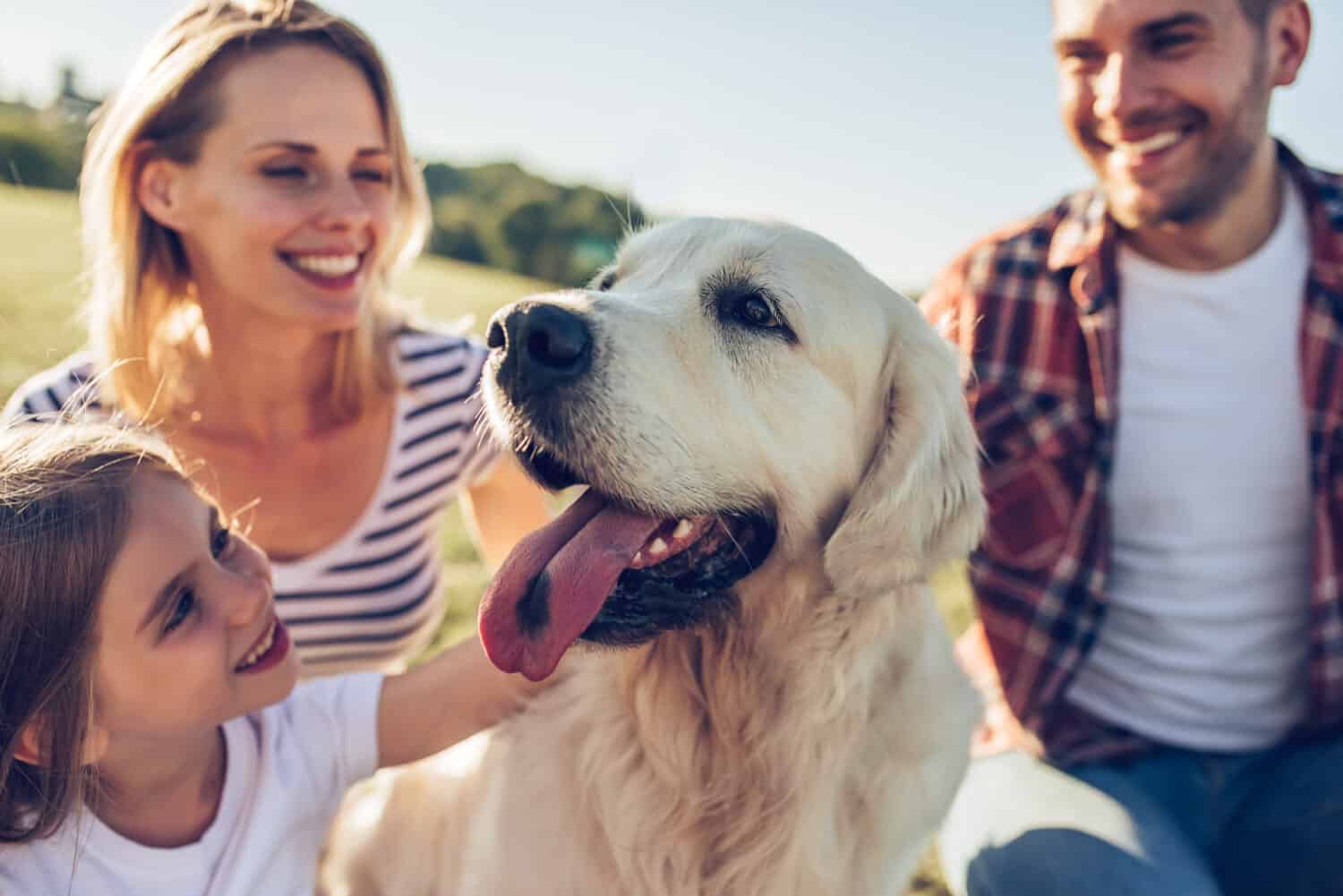
It can be difficult for a single person to give a Golden Retriever the time and attention they need.
©4 PM production/Shutterstock.com
Most single people don’t have the lifestyle that allows a Golden Retriever to thrive. They shouldn’t be left alone for an entire work day, especially after you factor in commute time, errands, and social activities outside the house.
Some Goldens will be okay with a dog sitter or dog walker dropping in around the middle of the workday, but this won’t be enough for many.
They prefer to have someone home with them most of the day. Ideal families include people who work from home and couples who work different shifts with little overlap.
7: They’re High-Energy Dogs
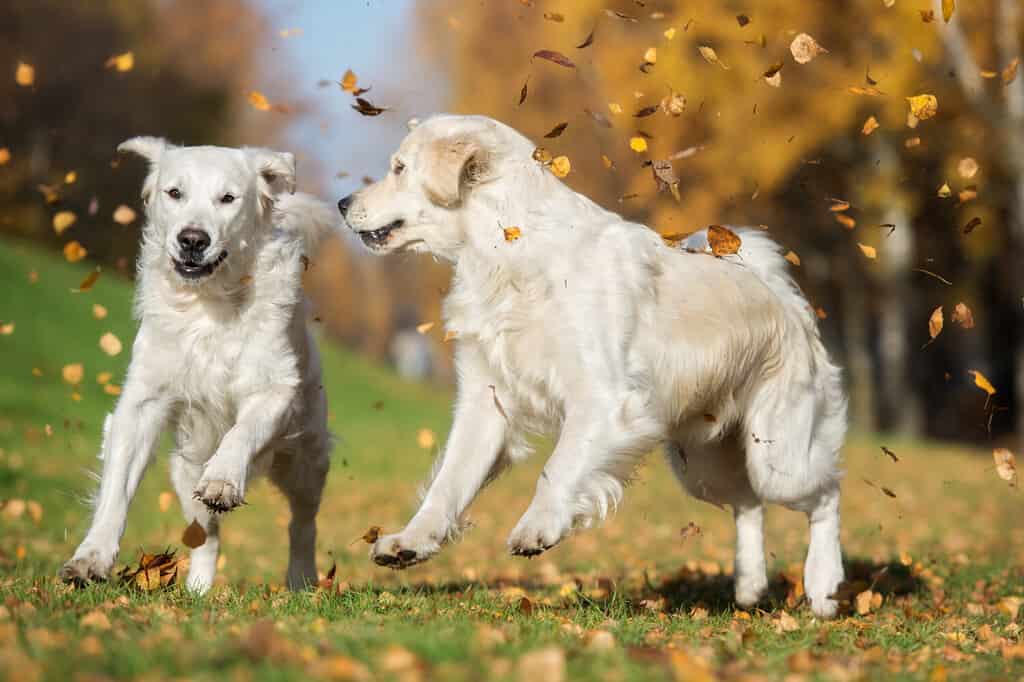
They aren’t couch potatoes but instead need ample exercise every day.
©otsphoto/Shutterstock.com
Golden Retrievers are considered a sporting breed, originally bred to hunt birds and deer. They love running, chasing, and swimming.
If you don’t have an hour or more to exercise your dog each day, besides caring for their other needs, then a Golden Retriever won’t be the right breed for you.
On the other hand, they thrive in active homes where they receive daily walks and playtime. Adults have enough endurance to take on other activities like running or hiking, although these aren’t recommended for puppies due to their growing joints.
8: They have Strong Prey Drives

Golden Retrievers were bred to chase and retrieve prey.
©iStock.com/Tatyana Consaul
It’s important to remember that your Golden Retriever was bred to hunt. They especially love chasing and retrieving things.
This may present as your Golden pulling on the leash when they see a squirrel, chasing a rabbit across the yard and bringing it to you, or even chasing smaller pets or children when they run.
They must have an appropriate way to act out these instincts, such as a flirt pole or retrieving toys from a body of water.
Introduce them to smaller pets slowly, with your Golden Retriever always on a leash until you can trust them not to chase. Keep them on a leash or confined around hyperactive children, and teach manners, such as not jumping or nipping, as early as possible.
9: That “Puppy Energy” Sticks Around

Goldens as old as two years old may maintain their puppy energy and habits.
©alexgo.photography/Shutterstock.com
Your Golden Retriever will grow up slowly and may retain their puppy energy and immaturity until around two years old. Even then, don’t expect them to slow down!
While puppies require short, frequent bursts of activity, adult dogs have more stamina for longer activities. This is when you should begin taking them for long walks, playing for longer, and considering other activities you can do together.
10: They’re Mischief-Makers

They love getting into a bit of trouble and can be rebellious!
©Cindy Hughes/Shutterstock.com
Golden Retrievers are people pleasers, but they aren’t always going to be perfect. Every dog breed has its quirks; for Goldens, it’s their humor, playfulness, and tendency to steal your things!
They can be stubborn when they want to be, especially around playtime and if they’re bored. They might take your things to initiate a game of tug or chase or simply because it’s their instinct to do so.
Keeping off-limits things out of reach is essential, especially if they’re valuable or dangerous. When puppy-proofing your home, don’t forget to look for toxic plants, cleaners, and foods that your dog may be able to get into, given the chance.
11: Some People Find them Overly-Friendly

Most Goldens want to be everyone’s friend, which can be tiring for introverts.
©Chendongshan/Shutterstock.com
If you’re a cat person, a Golden Retriever can feel too in your face. They’re excitable and tend to see most people and dogs as friends to be made. For both people and dogs, however, this can be overwhelming.
It also means that they don’t make good guard dogs. While some individual dogs will feel protective over their people and have good instincts for detecting threats, it’s not something to count on in the breed as a whole.
Lastly, you may be shocked at how many people you speak to on your walks if you’re an introvert. Not only does Golden Retrievers love everyone, but everyone seems to love them–they’re very approachable dogs.
12: They Shed
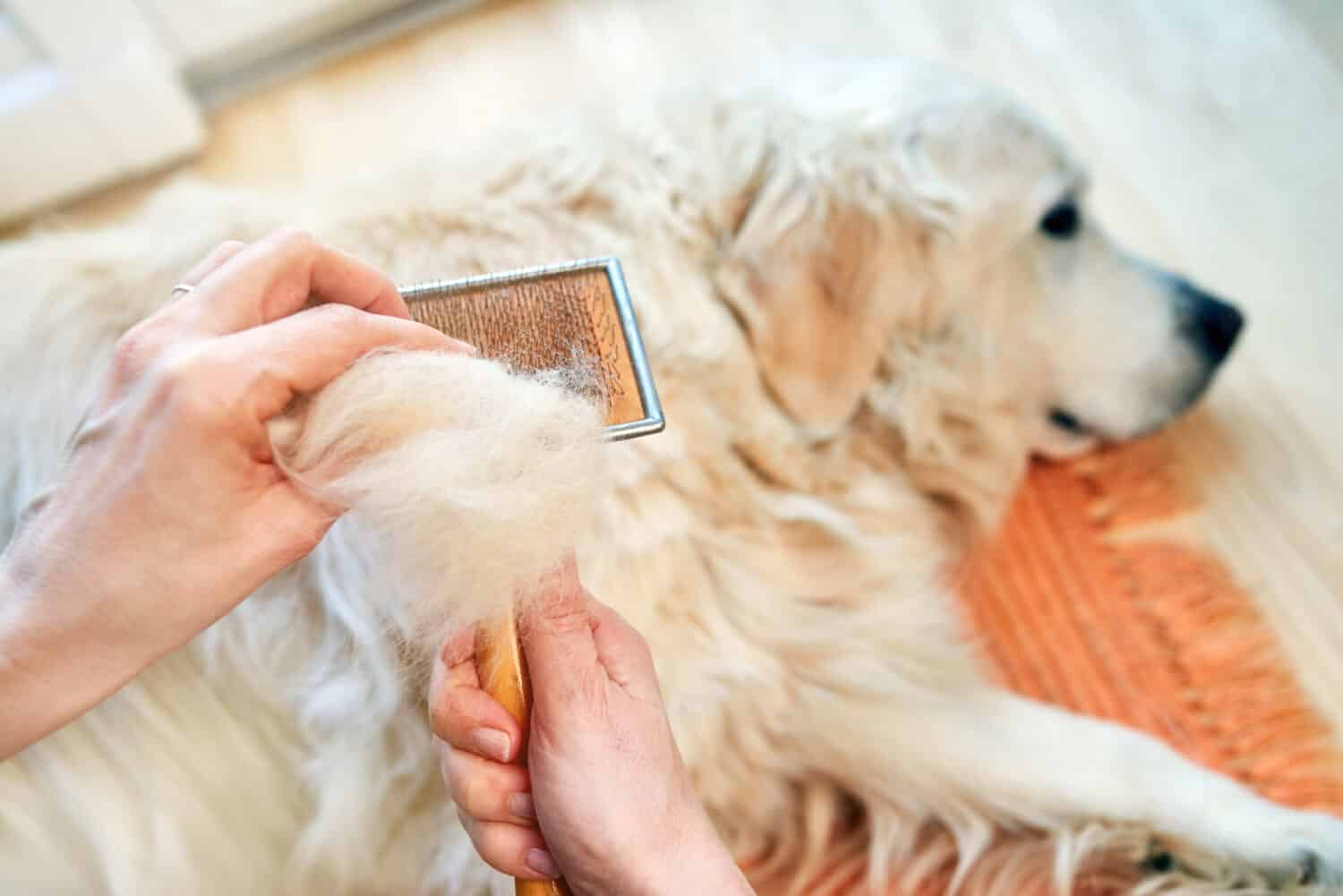
You’ll find your Golden Retriever’s fur everywhere.
©sonsart/Shutterstock.com
Golden Retrievers are moderate, year-long shedders. You’ll find their light fur everywhere, which stands out against darker colors, such as your favorite black shirt.
During the shedding season twice yearly, Goldens lose their undercoat. This means that they shed even more heavily.
13: You have to Brush Them
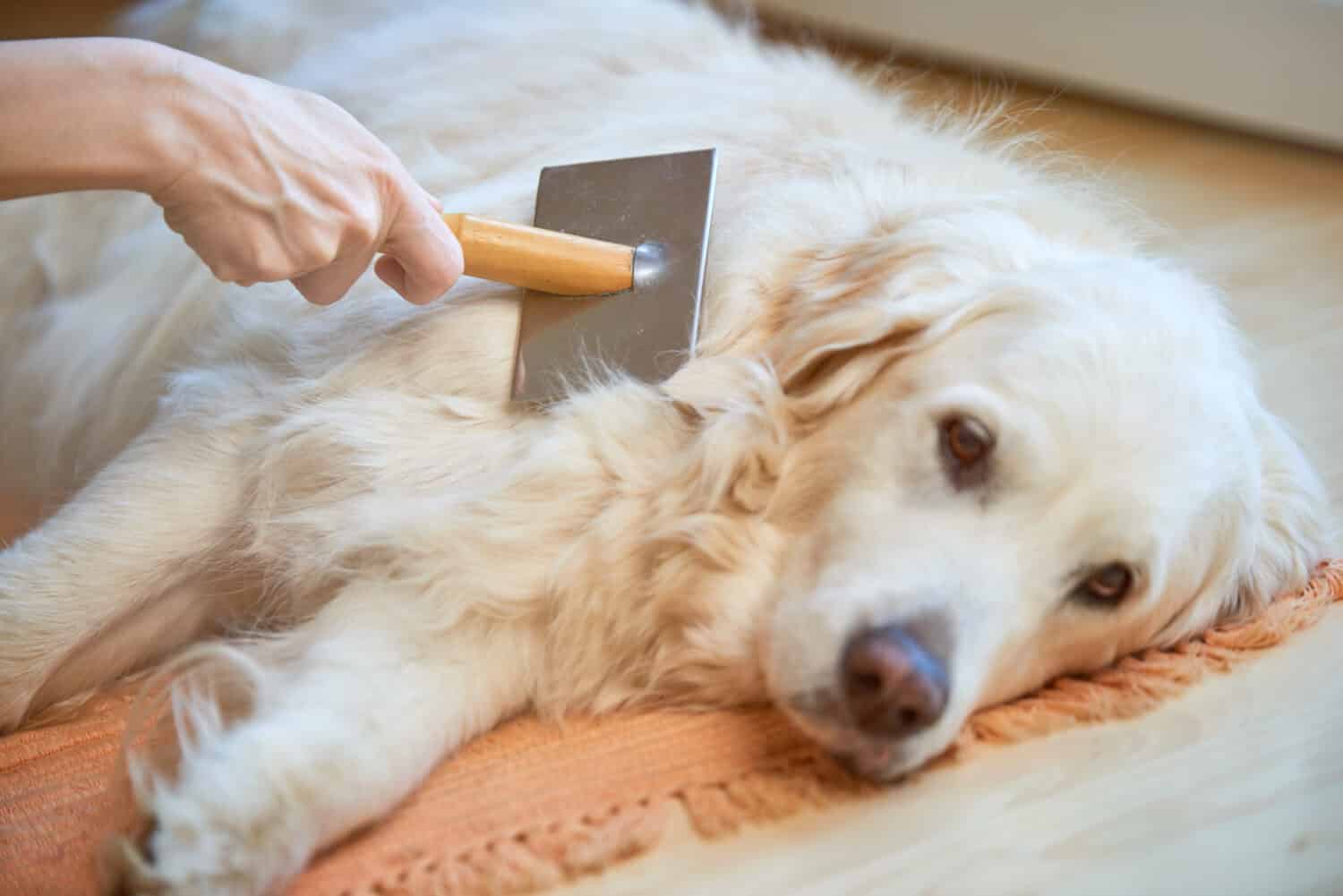
During shedding season, Golden Retrievers must be brushed daily.
©sonsart/Shutterstock.com
Short-haired dogs can tolerate some neglect when grooming; it doesn’t matter if you miss a brushing.
Goldens aren’t the same in this regard. They should be brushed one to two times a week throughout the year.
During the shedding season in the spring and fall, they’ll need to be brushed daily. This removes shed fur, promotes a healthy coat and skin, and prevents matting.
Mats in a dog’s fur tug at the skin, causing pain. They can also cause painful skin conditions.
14: They’re Messy

They don’t mind getting messy or bringing that mess inside!
©praditkhorn somboonsa/Shutterstock.com
Golden Retrievers are sporty and love outdoor activities. Unlike some dogs, they also don’t tend to mind getting wet.
Your outdoor adventures with them will bring mess into the home unless you’re meticulous about wiping their paws and bathing them immediately when needed.
Don’t be surprised if your Golden rolls around in the mud, splashes through puddles outside, or has debris in their fur after a hike through the woods.
15: They’re Large Enough to Knock Over Children
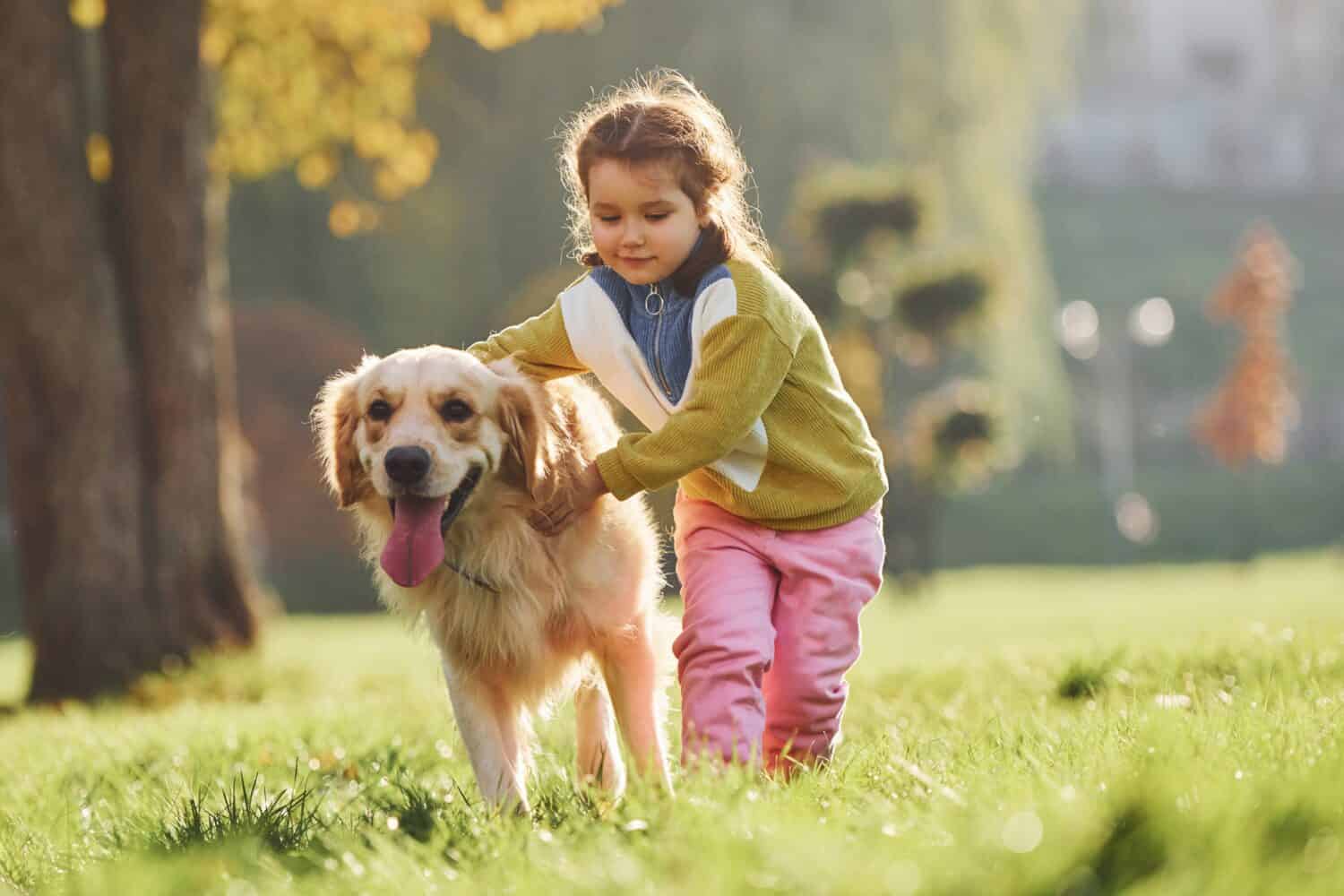
Hyper Goldens can knock small children over on accident.
©Standret/Shutterstock.com
Golden Retrievers are said to be good with children, but this doesn’t mean they should ever be left together unsupervised. An adult must regulate behavior and excitement levels for the dog and the child.
Overexcited Goldens can accidentally knock children down, especially if they jump on them. This is also a concern with elderly or disabled people who may have difficulty maintaining their balance.
When they get running, Goldens can even knock over healthy adults! Be sure to teach basic manners early on and implement management techniques to separate your Golden Retriever from children when necessary.
For instance, it’s likely best for the kids not to be in the way when your Golden Retriever is excitedly running around with another dog.
16: They’re Mouthy
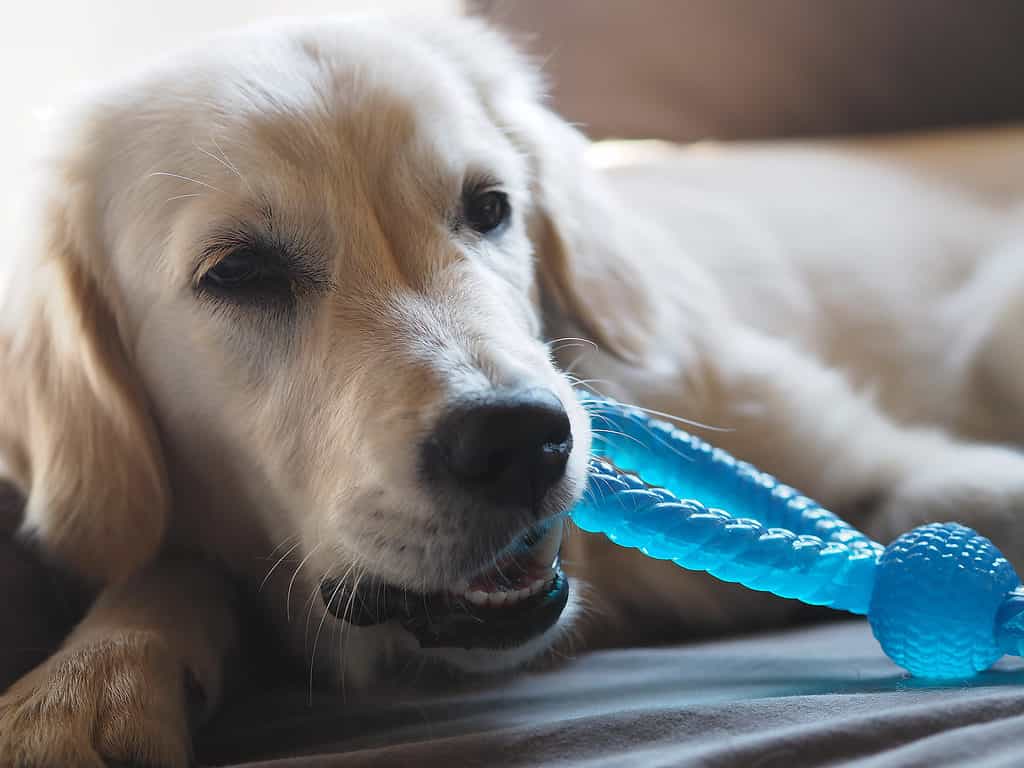
Golden Retrievers love to chew, sometimes inappropriately.
©iStock.com/zabo69005
Goldens like to catch and hold things in their mouths like all retrievers. They also love to chew, especially as puppies.
They may take off with your things or go through many toys. Remember that shredding items is very enriching for dogs, and providing them with safe ways is best. Although it can seem like a waste, it isn’t!
17: They’ll Overeat if Allowed

Limiting treats to keep your Golden Retriever at a healthy weight is important.
©Kashaeva Irina/Shutterstock.com
If you give your Golden Retriever food, they will likely eat it. Some will even eat things that aren’t food, leading to intestinal blockages.
Food motivation makes Goldens easy to train, but it also has downsides. Responsible dog guardians will keep dangerous items out of reach, provide healthy meals, and limit treats.
Although those puppy dog eyes are tempting to give into, it’s important for their health that your Golden Retriever maintains a healthy weight.
18: Difficult to Find as Rescues
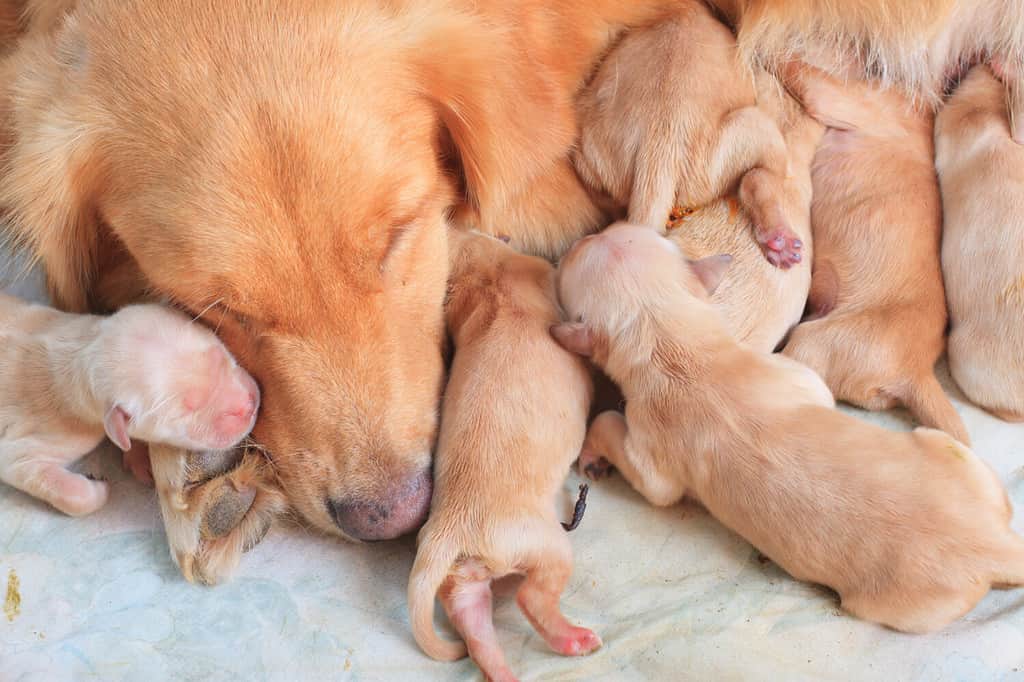
Golden Retrievers don’t tend to stay long at shelters.
©stockphoto mania/Shutterstock.com
It’s not often you see a Golden Retriever in a shelter. They’re usually pulled by rescues quickly and adopted out soon after.
In addition, there’s the problem of “retail rescue” or rescues profiting from their dogs. Sometimes, these are puppy mills disguised as rescues, but they adopt out all or mostly young puppies.
All in all, it’s a good thing that Golden Retrievers aren’t overpopulating shelters, and there’s no issue with adopting from a reputable breeder so long as you do your research.
However, it can be frustrating for those who prefer to adopt a rescue dog. I would recommend seeking a reputable, breed-specific rescue or adopting a similar breed more commonly found in shelters, such as a Labrador.
19: There are a lot of Bad Golden Retriever Breeders

Not all Golden Retriever breeders are breeding for the right reasons.
©otsphoto/Shutterstock.com
Due to the Golden Retriever’s popularity, many bad actors will breed them for profit. This tends to worsen the health and temperament of the breed.
It’s important to ensure you’re adopting from a reputable breeder, never a backyard breeder or puppy mill.
Backyard breeders are people who aren’t knowledgeable about their breed or breeding itself or don’t care to do the work required to breed ethically. They tend to be everyday people breeding at a relatively small scale but still perpetuating harm to their dogs and the breed as a whole.
Puppy mills breed at a much larger scale and for profit, disregarding the dogs’ health and well-being.
Reputable breeders are experts on their breed and will answer all your questions honestly. They’ll be happy to discuss health and behavioral problems in your Golden Retriever and let you meet the puppies and parents and see where the dogs are raised.
They don’t overbreed their dogs and don’t have a plethora of litters available at once. The parent dogs have completed all recommended health testing, and they don’t breed dogs with genetic conditions.
There is almost always a waitlist for a reputable breeder because they find homes for puppies before birth. Being able to take a puppy home immediately is a massive red flag.
All reputable breeders will also have you sign a contract stating that your dog goes back to them if you can no longer care for them. They will also come already microchipped and with the breeder’s name on the chip in case of emergency–reputable breeders care about their dogs and never want them to end up in a shelter or rescue.
20: They’re Prone to Health Problems
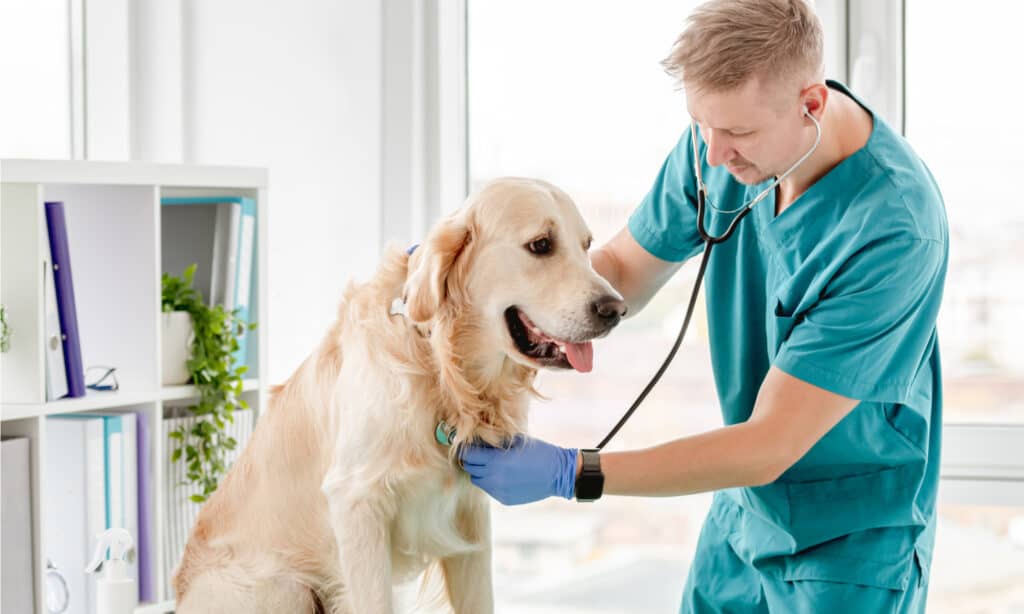
Cancer is more commonly seen in Golden Retrievers than in other dog breeds.
©Tatyana Vyc/Shutterstock.com
Golden Retrievers are prone to various health problems, some of which can be avoided by adopting from a reputable breeder who health tests their dogs before breeding, and others cannot.
Common health conditions in Golden Retrievers include:
- Hip and elbow dysplasia – This occurs when the hip or elbow joint doesn’t develop properly. In some cases, surgical correction is required.
- Eye conditions – such as juvenile cataracts, pigmentary uveitis, and progressive retinal atrophy
- Heart disease
- Allergies and ear infections
- Hypothyroidism – The thyroid doesn’t produce enough hormones, causing a slower metabolism and other symptoms.
- Gastric Dilatation-Volvulus – Also known as GDV or bloat, this is an emergent, life-threatening condition where the stomach twists inside the body. Impacted dogs will die quickly without veterinary treatment.
- Cancer – Golden Retrievers are more prone to cancer than other dog breeds.
Golden Retrievers are excellent dogs overall, but it’s important to know the downsides of a breed before adoption. Hopefully this article has helped you to learn more about Golden Retriever care, their quirks, and things you might find troublesome about the breed.
If they’re not the right fit, don’t fret! You may be better off with a smaller, lower-energy dog breed, or a longer-coated breed that doesn’t shed. Maybe you’d even prefer a pet cat or rabbit, but your perfect furry friend is surely out there.
Thank you for reading! If you have feedback on this post, please contact the AZ Animals editorial team.
The photo featured at the top of this post is © Joop Snijder Photography/Shutterstock.com
Ready to discover the top 10 cutest dog breeds in the entire world?
How about the fastest dogs, the largest dogs and those that are -- quite frankly -- just the kindest dogs on the planet? Each day, AZ Animals sends out lists just like this to our thousands of email subscribers. And the best part? It's FREE. Join today by entering your email below.
Thank you for reading! Have some feedback for us? Contact the AZ Animals editorial team.







